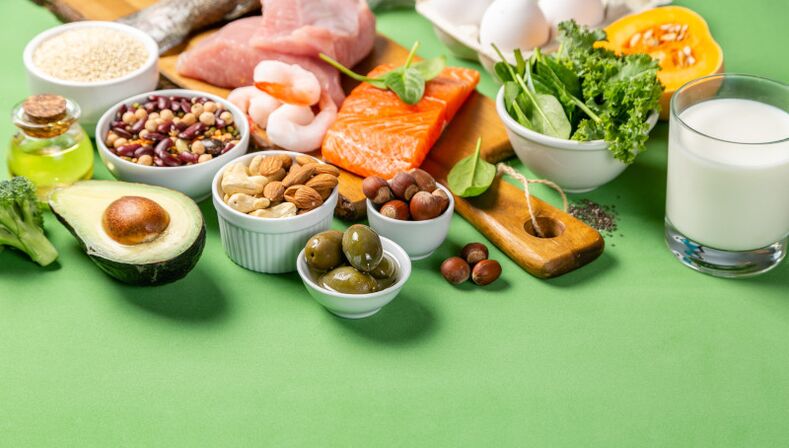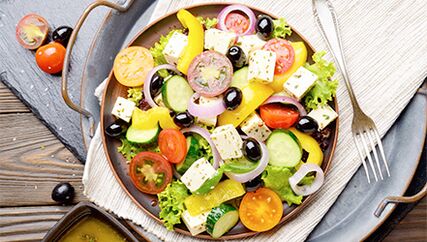Diet is good for longevity

Basic principles of diet
- included in daily diet;
- Consume 1-4 times a week;
- No more than 1-2 times per month.
greening
dairy
- Dietary goat cheese is low in calories but rich in B vitamins and trace elements as well as easily digestible protein.
- Feta cheese, made from sheep or goat's milk, helps control blood pressure, calm the nervous system and strengthen bones.
- Spicy Parmesan cheese leads the pack in protein, vitamins and amino acids.
- Silky provolone cheese is also rich in enzymes that are good for humans, giving it an unusual flavor.
vegetable
meat and fish
Fat

olive oil
Spices, seasonings, aromatic oils
red wine
Benefits of the Mediterranean Diet
- Products on this diet are minimally processed and contain no additional refined sugars.
This includes olive oil, vegetables and fruits, legumes, nuts, durum wheat whole grains and small amounts of animal products, which must be "organic" and not shelf-stable. Virtually no GMOs, artificial ingredients, preservatives, flavor enhancers and minimal sugar. For dessert, Mediterranean people use fruit or light homemade desserts using natural sweeteners such as honey. The animal component of the diet includes moderate amounts of cow, goat or sheep cheese and yogurt and plenty of locally caught fish. This is a source of omega-3 fatty acids and other healthy fats, the "right" cholesterol, which strengthens blood vessel walls. - Improve cardiovascular system
High intakes of monounsaturated fats and omega-3 foods are associated with a significant reduction in all-cause mortality, especially from heart disease. Many studies have shown positive effects of a Mediterranean diet rich in alpha-linolenic acid (ALA) found in olive oil, including a 30% reduction in the risk of death from cardiovascular disease and a 45% reduction in acute heart failure. The Warwick School of Medicine also found that people who regularly consumed extra virgin olive oil lowered their blood pressure faster than those who primarily consumed sunflower oil. Additionally, Mediterranean people have extremely low levels of "good" cholesterol, which is extremely rare because they habitually get a lot of healthy fats from their natural diet. - Lose weight the healthy way
With this diet, you can eat a variety of delicious foods without feeling hungry. Therefore, you can follow this diet for a long time without crashing, regulate your weight and reduce your fat intake in a simple and natural way. Whether you prefer to increase the carbohydrate content or emphasize high-quality protein products from animal and especially plant sources, there is room for variation in the Mediterranean diet. Regardless, this way of eating will help regulate weight gain, control blood sugar levels, improve mood, and maintain consistently high energy levels. - cancer prevention
Researchers from the Department of Surgery at the University of Genoa in Italy say that fruits, vegetables, olive oil and wine contain a balanced ratio of omega-6 and omega-3 essential fatty acids, high fiber content, antioxidants and polyphenols that may protect human health. DNA is protected from damage and cells mutate, reducing inflammatory processes and slowing tumor growth. Olive oil may also reduce the risk of colon and bowel cancer. - Diabetes Treatment and Prevention
The Mediterranean diet controls excess insulin, the hormone that controls blood sugar, causing us to gain weight and maintain weight while dieting. There is good evidence that the Mediterranean diet can serve as an anti-inflammatory diet and help combat diseases associated with chronic inflammation, including metabolic syndrome. A diet low in sugar and high in fresh foods and fats is a natural part of a diabetic lifestyle. The Mediterranean eating style helps prevent blood sugar spikes and dips. Carbohydrates—in the form of whole-grain bread or durum wheat pasta, often combined with olive oil or cheese, and plenty of greens and vegetables—are an excellent source of energy for a few hours without causing significant spikes in blood sugar levelsElevated and early hunger. - Protect cognitive health and promote good mood
Healthy fats like olive oil and nuts are known to help combat age-related cognitive decline. They counteract the harmful effects of toxicity, free radicals, a poor inflammatory diet, or food allergies that can lead to brain dysfunction. Cognitive impairment occurs when the brain does not receive enough dopamine, an important chemical needed for normal body movement, mood regulation, and mental function. Probiotic foods like yogurt and kefir promote healthy gastrointestinal function, which has also been linked to cognitive function. Therefore, a Mediterranean diet may be a natural treatment and prevention method for Parkinson's disease, Alzheimer's disease, and age-related dementia. - Prolong life
Back in 1988, a study in Lyon asked heart disease patients to follow either a Mediterranean diet rich in monounsaturated fat or a standard diet significantly reduced in saturated fat. Four years after the study began, follow-up results showed that compared with patients in the first group, patients in the first group were 70% less likely to develop heart disease and had a 45% lower risk of death from any cause. Diet standard group. Meanwhile, total cholesterol levels were not significantly different, proving that it is not directly related to heart disease. The results were so impressive and groundbreaking that the study was stopped early for ethical reasons so that all participants could continue to follow the Mediterranean diet for maximum health and longevity. - Helps relieve stress and relax
Chronic stress can significantly reduce quality of life and negatively impact weight and overall health. The Mediterranean diet encourages you to spend more time in nature and get a good night's sleep. This is a great way to relieve stress and prevent inflammation. Plus, there’s more time to laugh, dance, relax, and pursue your hobbies. - fight depression
A 2018 study published in the Journal of Molecular Psychiatry found that a Mediterranean diet may reduce the likelihood of depression. Inflammation is often thought to be the root cause of many illnesses and mental illnesses, including schizophrenia, obsessive-compulsive disorder, depression, anxiety, fatigue and social withdrawal. In contrast, a nutrient-rich diet helps protect the brain from organic and functional changes. Other changes in diet and lifestyle, such as getting enough sleep, paying attention to what you eat, choosing your menu in advance, and limiting stress, can lead to stable mental health.




What is possible and how often
- Fresh fruits (apples, bananas, pears, citrus, figs, peaches, apricots, berries, melons, watermelons);
- Vegetables (mainly non-starchy vegetables such as tomatoes, eggplants, artichokes, various cabbages), green vegetables (especially leafy greens - spinach, lettuce);
- Whole grain products (brown rice, rye, barley, corn, buckwheat, whole oats, wheat and their products - bread and pasta);
- Beans and legumes (lentils, chickpeas, beans, peas, peanuts);
- Root vegetables (yams - sweet potatoes, radishes, yams, parsnips, Jerusalem artichokes);
- Nuts and seeds (walnuts, almonds, hazelnuts - hazelnuts, macadamia nuts, cashews, sesame seeds, sunflower seeds, pumpkin seeds);
- Spices and herbs (garlic, nutmeg, cinnamon, pepper, basil, mint, rosemary, sage) allow you to minimize the amount of salt in your diet;
- Vegetable fats (olive oil, pure avocado and their oils);
- About 2 liters of purified water per day, you can drink tea or coffee, but sugar-sweetened drinks and fruit juices should be avoided;
- Dairy products – cheese, yogurt or kefir – in moderation;
- Red wine in moderation (but this is completely optional).
- Fish and seafood (prefer wild fish over farmed fish), shrimp, oysters, clams, mussels, crabs - at least 4 times a week;
- Eggs - moderate amount, 2-4 times a week;
- Potatoes - appropriate amount;
- some sweets.
- red meat;
- Poultry (chicken, duck, turkey) and lean meats (rabbit, ham, pork loin).
- Refined sugar and its products (ice cream, candy, beverages, table sugar);
- highly processed grains (white bread, soft wheat pasta, polished grains);
- trans fats (margarine and products containing margarine);
- Refined oils (all types, including soybean, canola, cottonseed);
- Processed meat products (sausages, sausages, semi-finished products);
- Products that have been additionally processed or concentrated (labeled "low-fat, " "concentrated, " "refined").
This week's menu
- Breakfast - yogurt, cereal and berries.
- Lunch - cabbage soup and roast meat.
- Dinner - Green salad with eggs, drizzled with olive oil and lemon juice.
- Snacks - fruit salad with seasonal fruits, a handful of nuts.
- Breakfast - Oatmeal, flax seeds, honey and banana chips.
- Lunch – Lasagna with vegetables.
- Dinner – Grilled eggplant with feta and cheese sandwich.
- Snacks – probiotic yogurt, grapes and popcorn.
- Breakfast – Berry pudding made with Greek yogurt and chia seeds.
- Lunch – Whole wheat sandwich with vegetables.
- Dinner: Grilled salmon with brown rice and vegetables.
- Snack – roasted pumpkin seeds, celery and peanut butter.
- Breakfast - omelette with tomatoes, green peppers, onions, broccoli and feta cheese.
- Lunch – Spinach puree soup with sour cream, cream or Greek yogurt, oven baked potatoes.
- Dinner – Shrimp salad, drizzled with olive oil.
- Snacks – Assorted tropical fruits, carrots and hummus.
- Breakfast - Oatmeal, dried fruit and nuts.
- Lunch - vegetable soup and chicken soup.
- Dinner - fried or grilled fish.
- Snacks – kale or zucchini slices, olives.
- Breakfast – Sweet potato casserole with spinach and cheese.
- Lunch – Mediterranean whole wheat pizza with cheese, vegetables and olives.
- Dinner - salmon with buckwheat, cabbage salad.
- Snacks - fruits, cheese and dried fruits.
- Breakfast - Bifidobacterium yogurt with chopped fruit and nuts.
- Lunch - tuna salad, drizzled with olive oil.
- Dinner - Greek salad with cucumbers, tomatoes, black olives, spinach, feta cheese, olive oil, a lean steak.
- Snacks - assorted nuts, fruit salad.
Disadvantages and dangers of dieting































